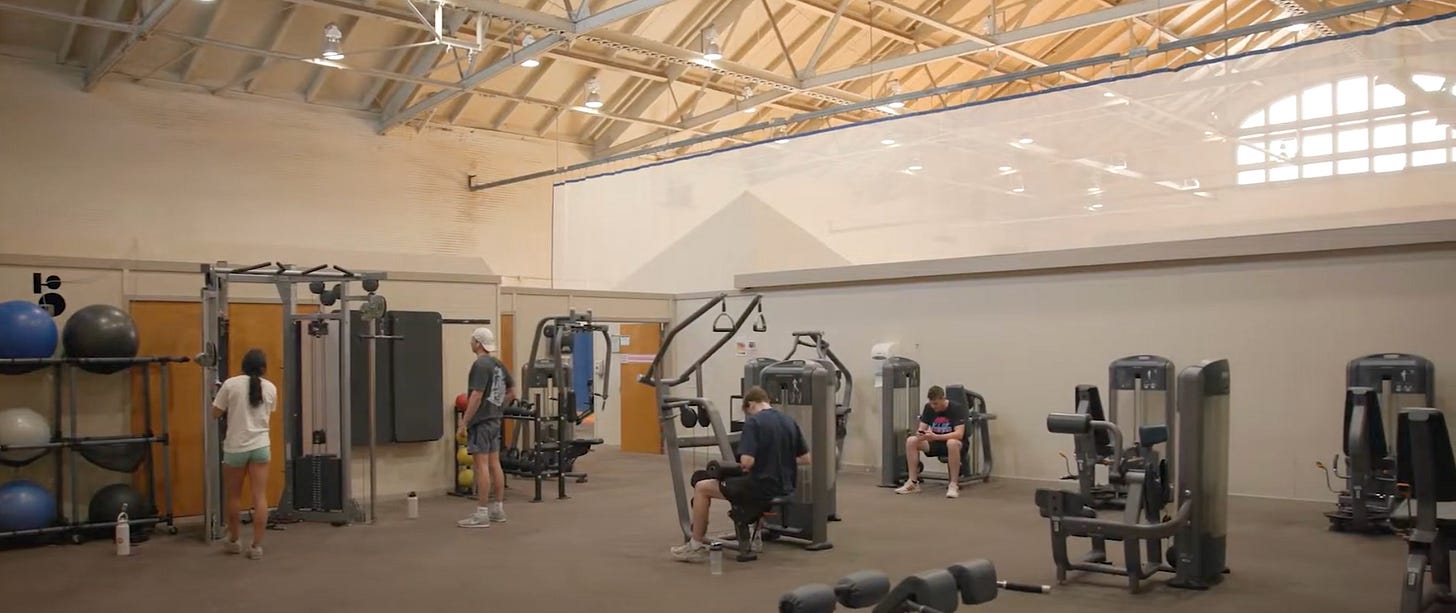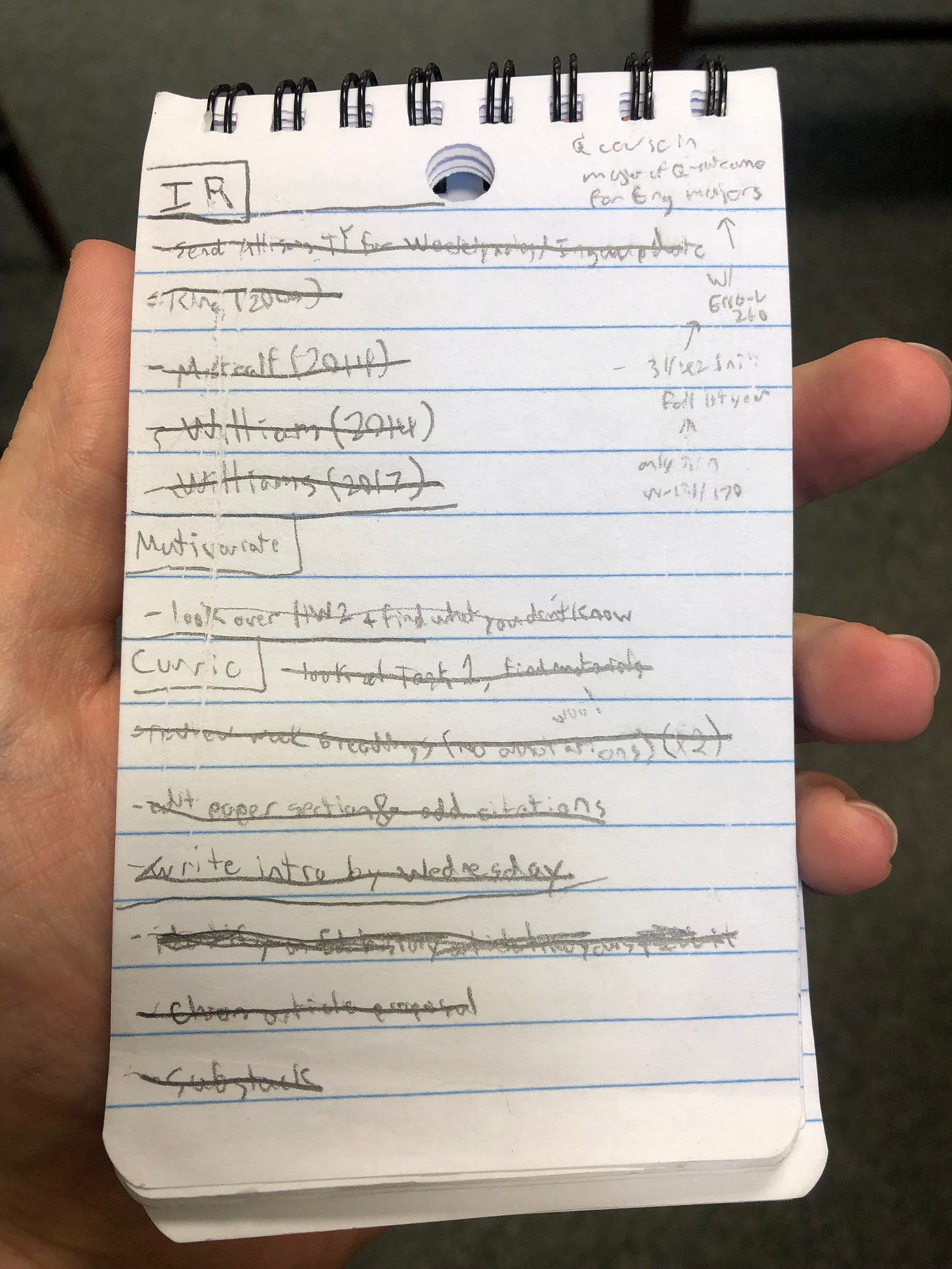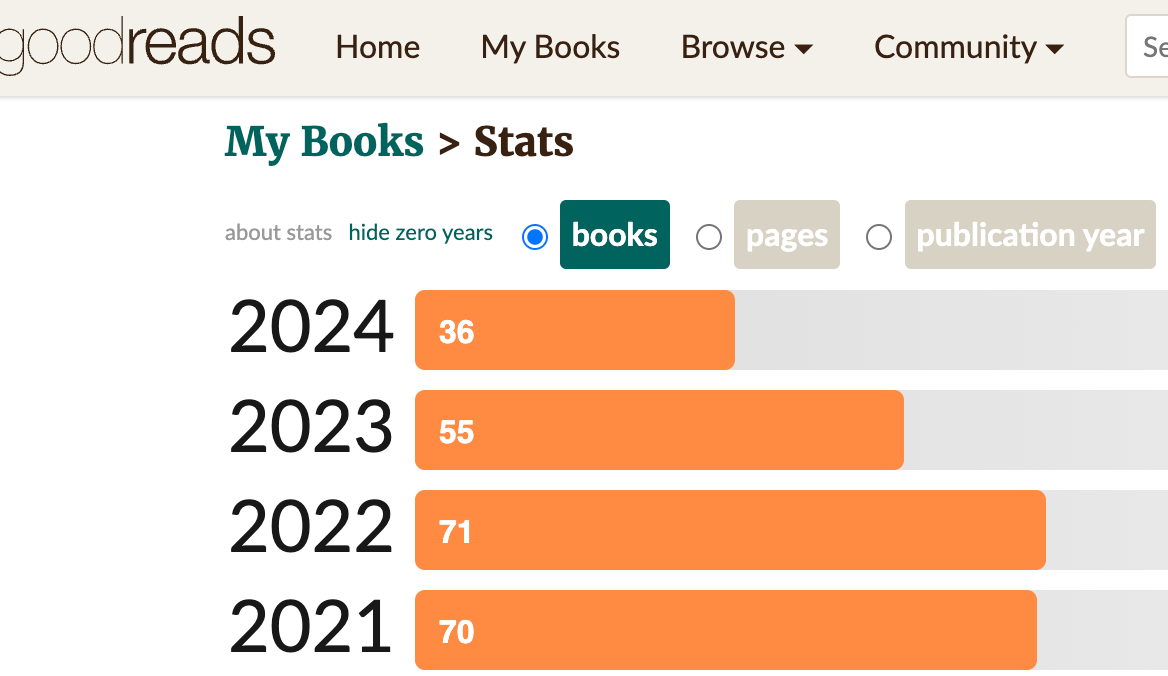Graduate school can be a grind, no matter the duration or discipline of your degree.
Graduate students are, definitionally, further along in life than undergraduates. Whether it’s by a few months or a few decades, that distance usually means life is more complex for folks in grad school. You may get a dog or be working another job or get married or have kids…
And yet, you still have to do your homework.
So as a 36 years-old person, I thought I would share a few things about how I’m trying to keep it together while securing my next institutional credential. This is not to say that my life is perfectly balanced. But after a year and a half of doctoral education, there are a few things that have made the process more sustainable.
1. Exercise early, exercise often
The photo above is from one of my favorite places on campus. The cardio circuit gym is a small facility in the smaller of IU’s two gyms. I go there every weekday morning.
When I began my graduate degree, I felt like it was an opportunity to reset my lifestyle. When I taught high school, I needed to leave home by 7 AM to get to work in time. Now I live on campus, and nothing starts before 9 AM. It felt like I got two hours of my life back.
I decided to do something I’d never done before: I started lifting weights.
While I have not become a meal-prepping alpha bro, I have enjoyed the process. I have no timeline and no goals. But I like it when I can feel myself getting stronger.
What does this have to do with grad school? Well, the most obvious thing is that going to the gym means I get at least some active movement each day. Everything else in my academic life is pretty unavoidably sedentary. My morning routine brings corporeal balance; feeling better physically makes school easier too.
Psychologically, I also enjoy accomplishing something at the beginning of the day. My writing may be bad. I may say something dumb in class. I may be even worse at statistics than I thought. But at least I made the weights go up and down. At least I move more weight than I used to. That’s a win.
Having at least one win each day is nice.
2. Office Hours
When you’re in college, most of your work happens outside class time. In a PhD program, this is even more extreme. There’s lots to do, but little of it gets done while you’re in class. This will only grow more extreme once I am working on a dissertation and have no class time whatsoever.
Because there are no boundaries on when I can do my work, it’s easy to let work occupy every moment. I can work a bit at a time and have it take all my time. My evenings. My mornings. My weekends.
The work will take as much time as I allow it to take.
As a rule, then, I set limits on when I can work. Generally speaking, I only work between 9-5 on weekdays. I also work for one afternoon each weekend.
Especially after having had a child this summer, I want to protect evenings and at least one day on the weekend. And, frankly, by the end of the day I’m so brain-dead that anything I work on will be made of inferior stuff.
I know when I can and can’t work, so I tend to pace myself accordingly. It almost always gets done in the time allowed. If there’s an exceptional week here and there where I have to break this rule, that’s okay. It just can’t become habitual.
Keeping a schedule of times when work is or is not allowed lets my brain decompress. It’s very easy to carry stress when I’m not working, feeling like I’m doing something wrong by trying to relax. This makes relaxation feel particularly un-relaxing.
But if I’ve decided ahead of time that work is impermissible, it’s hard to feel guilty about not working.
My brain needs that kind of break.
3. Use the notepad
When I started my degree, I realized I had no school supplies. Feeling a sense of youthful reversion, I grabbed materials off a Kroger shelf the week before classes began.
The most important thing I grabbed was this notepad:
I didn’t know what I would use it for, but I imagined I’d need it for all of my on-the-go note-taking needs.
I discovered a couple things. First, I never need to take notes on-the-go; I am almost always sitting down.
Second, this pad fits perfectly snugly in the front pocket of my bag, so I might as well keep it with me.
Simple as it appears, this pad of lined paper works perfectly as my weekly planner.
I use a single page every week— never more. At the end of every class, I take a minute to write down everything I need to do over the next week. At the bottom of the sheet, I may add some non-class obligations (like my weekly inscription of the word “Substack”).
When you’re in grad school, it feels like there’s always more that you “should” be doing. There’s more to read (or pretend to have read). There’s networking to do. There’s events to attend. And shouldn’t you be thinking about a conference proposal?
The potential obligations can fill reams. But what are your requirements?
When I limit myself to a single, small page, I have to be selective. I can only include so many goals each week. And if I expect to cross each element off within seven days, those goals need to be achievable.
As I said in the last point, I only have so many hours available to work. So, I need to limit my obligations to fit within those hours.
As a bonus, it’s really fun to cross stuff off the list. And once I’ve finished crossing off the last item, I like to decisively flip the page. Much like my gym routine, it’s a small and recurring victory.
The people who complete their PhD fastest do it in 4 years. It’s not uncommon at all to take 6 years or more.
That’s a long time, and it’s easy to become overwhelmed by the sense of slogging through when you think of it as a whole. Instead, I have to think of it as a series of weekly battles.
In striking each element off the list, I win a little battle.
4. Read other books
There is no shortage of reading to do in grad school. Almost all of my assigned reading centers on university and student issues. Almost all of it comes in the form of articles and chapters.
I miss books.
My capacity to read for fun has, tragically, declined. Because most of my school-related reading is not in book form, you can see this decline visually. Just check out my Goodreads stats:
The fact that there’s even that many is a testament to two things: 1) I don’t have classes every week of the year (May was a great reading month, for example) and 2) I force myself to always have a non-school-related book going, even when I’m at my busiest.
That said, most of my unassigned reading is still assigned in a manner of speaking. I am part of two years-long book clubs, and I decided when I started this program that I would continue to read every book for those. I’ve managed to keep it up so far.
For me, reading outside my field is an act of mental decompression. If my reading only goes in one direction, I forget that I can do other things with my brain. I need to read a little medieval Japanese Buddhist philosophy just to remember that my brain is malleable and capable.
I need to read a little to feel like myself again.
“Grad student” is something I do, not something I am
If there’s one theme to all this, it’s compartmentalization. I am not trying to be prescriptive here; these rules may not work for anyone but me. But in describing my own habits, I see that clear separations of work from not work are personally important.
If I want to maintain a balance, I need to make sure that I have large parts of my life which don’t have anything to do with my education. Reading and lifting weights aren’t the only things I do outside of school, though they may be two of my most habitual. The key for me is just having something that can’t overlap with the incessant pulse of academic obligation.
Will I be able to maintain this pattern in the years to come? Will my rules appear hopelessly naive in retrospect?
I have no idea. But for now, this approach is working for me. That’s all I can say for sure.
-Matt





Except for St. John's, I hate grad school. It is a grind. I should exericse and keep a list of things I need to do. One day.
Will the meal-prepping alpha bro ever do a guest post?